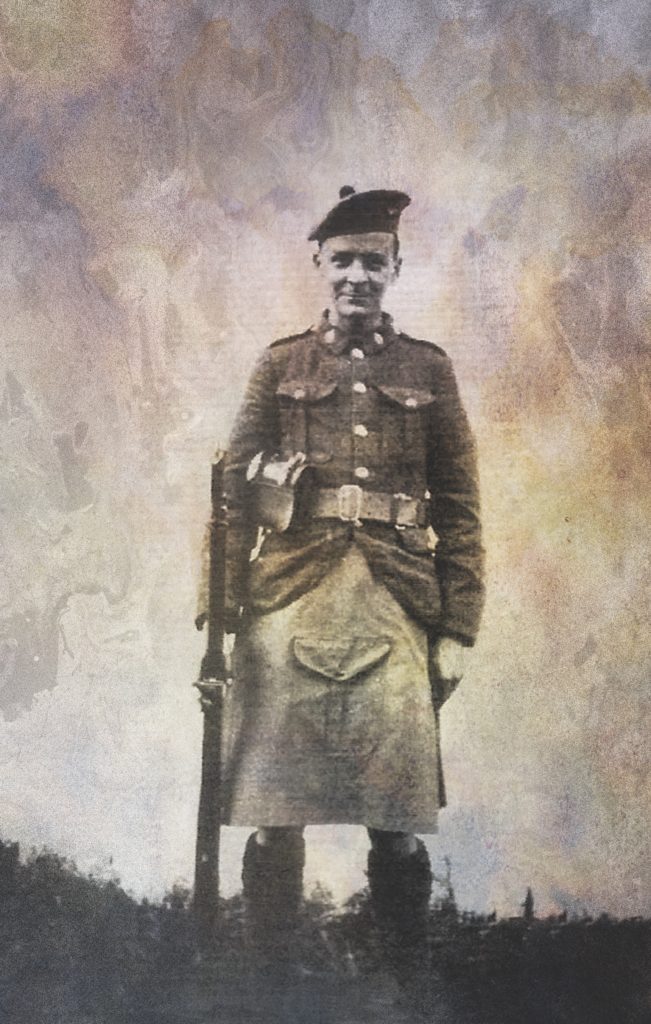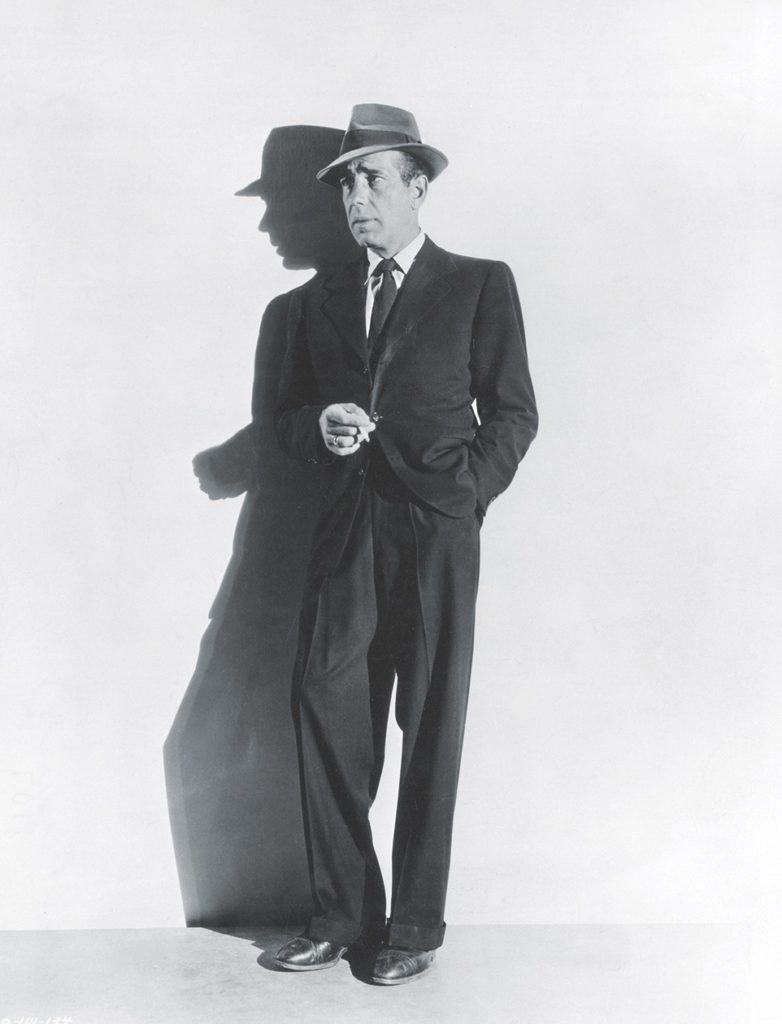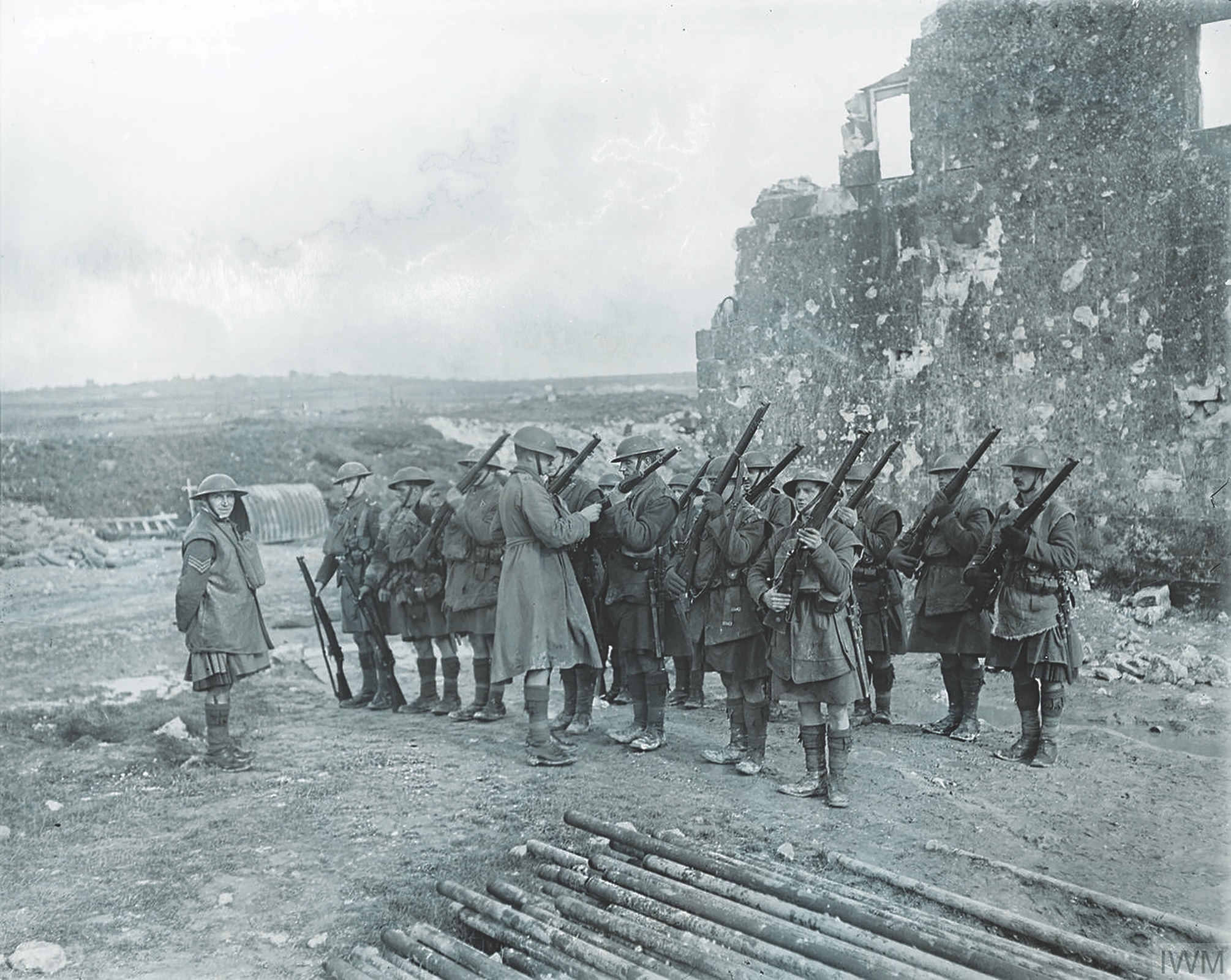In the photograph, the private allows himself a tight little smile as though he has just shared a wisecrack. A cutaway doublet-style jacket drapes his slight, 140-pound frame. He’s about 5-foot-9 and wears a khaki kilt apron with a pocket replacing the traditional sporran. His knees are bare. He holds the barrel of a rifle with his right hand, the butt resting on the ground. He looks like an underfed accountant forced into a Highland uniform, which is just what he was. Before enlisting in the military, he had worked as a bookkeeper for a creamery, handling its ice cream accounts.
His parents’ marriage had been cut short by his father’s alcoholism. The enlistment form asked whether his father was living. “I don’t know,” he wrote. He had turned 29 the previous month and had last seen his father when he was 7.
The Great War in Europe had been raging for three years by the time the photograph was taken. The private was entirely unknown. Years later, in 1939, as the world staggered toward another conflagration, he published, at age 51, his first novel, The Big Sleep.
Today, Raymond Chandler’s name evokes a punchy, hard-boiled style of detective fiction. His tough-guy private eye, Philip Marlowe, a boozer, as Chandler was, has been portrayed on the big screen by the likes of Humphrey Bogart, James Garner, and Robert Mitchum. Marlowe, a loner, is an honest man making his way through the seamy Los Angeles underworld. He is quick with a quip and fearless. He is knocked out—a lot. He is unlucky, of course, in love.
The creator of this paragon of American masculinity may have been born in United States, but he was raised in England and fought in World War I for one of the Dominions. On the day his photograph was taken, Chandler was wearing the uniform of the 50th Regiment, the Gordon Highlanders of Canada.

Raymond Thornton Chandler was born in Chicago in 1888. His peripatetic childhood was made more precarious after his father, Maurice (Morris) Chandler, a civil engineer for a railway company, abandoned his family. Mother and son depended on the assistance of her relatives, first in Nebraska and then in England, where they shared a red-brick house in London with an unmarried aunt and the boy’s grandmother. In September 1900, young Chandler, age 12, enrolled at Dulwich College, where he excelled in mathematics and the classics. An uncle covered the cost of studying French and German on the continent after graduation.
Since he was planning to enter the civil service, Chandler needed to settle the question of his citizenship on his return to London. Born in the United States to an American father and an Anglo-Irish mother, he applied for a certificate of naturalization from the Home Secretary. Three days later, on May 23, 1907, before a justice of the peace, Chandler signed an oath of allegiance to King Edward VII.
After working in the Admiralty for six months, Chandler left to try to support himself and his mother as a freelance writer. He lived in London’s Bloomsbury district, submitting poetry to the prestigious though stodgy literary magazine The Academy. Chandler was dissatisfied with his efforts, later dismissing his verse as “grade B Georgian.” Chandler also tried his hand as a journalist, working for the Daily Express and the Westminster Gazette.
In 1912 Chandler boarded the American Line steamship Merion in Liverpool bound for Philadelphia, a new start financed by a loan from the uncle. Aboard ship, he befriended Warren Lloyd, a Nebraska-born lawyer, who was traveling home to Los Angeles with his wife, Caroline, and their daughter and two sons. It was a fortunate meeting, for it was through the Lloyd family that Chandler would be introduced to the married woman who would in time become his wife. Chandler followed the Lloyds to the promised land of California, where he picked apricots for 20 cents an hour and earned $12.50 per 54-hour workweek stringing tennis rackets for a sporting goods company.
Chandler’s mother eventually arrived from England. She and Raymond moved in with the Lloyds in a stylish home in a posh neighborhood. The couple ran a weekly salon for a group of literary and musical friends they called The Optimists. Among them was Julian Pascal, a British–born pianist who performed at recitals and was the musical director at the Wilshire School for Girls. In 1917 Chandler wrote a libretto and Pascal the music for a comic opera in the fashion of Gilbert and Sullivan.
Chandler became besotted with Pascal’s wife, Cissy, a red-haired beauty. It was said that she did housework in the nude, though her acquiescence to drudgery was perhaps more surprising.
Thanks to Lloyd’s connections, Chandler got a job with the Los Angeles Creamery Company, completing a three-year bookkeeping course in just six weeks of nighttime study. He was promoted to manager of the creamery’s Santa Barbara branch. Ahead of him lay a career of modest, anonymous achievement. It was not what he wanted.
On March 31, 1917, Chandler signed a declaration of intent to become an American citizen, promising to renounce his allegiance to the British Crown, then embroiled in the third year of a grinding war against Germany and the Central Powers. If Chandler sought a change of citizenship to avoid military duty, his plan was upended just a week later when the United States ended its neutrality by declaring war on Germany.
On June 5, Chandler filled out a draft registration card. He described himself as single and the sole provider for Florence. He claimed exemption from the draft “on account [of] mother.” The following month his name appeared with a draft selection number in the Santa Barbara Daily News and Independent. By September, Chandler would be listed as delinquent in reporting for a medical examination, by which time he was already in uniform with an Allied nation.
As it happened, on August 14, 1917, a fine summer’s day in temperate Victoria, British Columbia, Chandler had reported to a mobilization center to volunteer for service with the Gordon Highlanders. What changed his mind and what brought him to Canada when American forces were seeking recruits for wartime service? It seems likely that Chandler had visited the San Fernando Building in downtown Los Angeles at Fourth and Main Streets. There, the U.S. Army was signing up volunteers adjacent to space operated by a recruiting office shared by the British and Canadians. angelenos go in steady stream to allied camps, the Los Angeles Times reported in a headline that month, adding, “British-Canadian recruiting office a place of romance and efficiency from which warriors depart in quiet groups, calmly and unsung.” The newspaper dispatched a feature writer and a sketch artist to observe a dozen volunteers for the Canadian armed forces board the 2 p.m. Pacific Electric train to the harbor to catch a boat bound for San Francisco and on to Vancouver Island. The 50th Gordon Highlanders, the resulting story said, was one of two “picturesque kiltie regiments” seeking reinforcements.
After 36 months of war, the slaughter on the Western Front left the Gordons in desperate need of reinforcements between the ages of 18 and 40. The regiment placed advertisements in newspapers promising single men $1.10 per day with all living and clothing expenses covered. Married men were promised that their wives would receive about $17 every month, as well as a $20 separation allowance. The regiment offered to pay recruits the cost of travel to Victoria and further offered to assist dependents with funds from the Canadian Patriotic Fund. The promise of financial support likely influenced Chandler’s decision. He had been giving his mother $60 a month.
Chandler arrived in Victoria with 30 other California recruits, including his 20-year-old London-born friend Gordon Pascal, Cissy’s stepson. Each witnessed the other’s attestation papers. On the form, Pascal listed his occupation as actor; Chandler said he was a journalist. Both statements were more aspirational than factual. Though only weeks earlier he had signed a promise to renounce his British allegiance in exchange for American citizenship, Chandler now vowed to “bear true Allegiance to His Majesty King George the Fifth” and agreed to serve in the Canadian Over-Seas Expeditionary Force for as long as war lasted between Britain and Germany. He again signed his name, as did Pascal as witness. Both were warned that a false statement could mean as much as six months’ imprisonment under the Army Act.
The Gordons bivouacked at Willows Camp, a flat expanse of fairgrounds (including a horse racing track) just east of the city. Recruits were put through training that included aerobic exercises and such strengthening regimens as straight-arm plank holds. They also played cricket and other sports. For practice, they thrust bayonets into bales of twigs.

If Chandler had a chance to read the local newspapers on his arrival, he would have known about China’s entry into the war and about Canada’s success in capturing a strategic position overlooking the occupied French city of Lens in the celebrated Battle for Hill 70. The newspapers printed casualty lists, of course, as well as news about an upcoming meeting of the Win-the-War League at the Royal Victoria Theatre. He might also have spotted a small advertisement for a tearoom offering ice cream and tobacco and only recently named Vimy Ridge after Canada’s great victory three months earlier. He would see the real Vimy Ridge soon enough.
Chandler sailed to England aboard the converted ocean liner Megantic, arriving in Liverpool on December 7, 1917. By March he was in the field with the 7th Battalion, one of 126 reinforcements to join in a reserve position at Loos, France. He was posted to No. 1 Company.
Almost without delay, his battalion was in the trenches, enduring sniper fire, shelling, and gas attacks. In just three months, he would be rotated into the front lines near Vimy Ridge as Germany’s massive spring offensive, dubbed the Kaiserschlacht (Kaiser’s Battle), bolstered by divisions diverted from the Eastern Front following the Russian Revolution, hammered into British forces.
There was little respite even behind the lines. Many dawns were heralded by explosions of long-range artillery shells; gas shells kept all alert; occasionally a bomb from an enemy biplane fell from the sky.
After two months Chandler was promoted to acting sergeant and given command of 30 men. “Once you have had to lead a platoon into direct machine-gun fire,” he would later reflect, “nothing is ever the same again.” The slaughter he witnessed changed his outlook on life, which perhaps would find expression in the coming years through his own destructive behavior.
After a dozen harrowing weeks on the Western Front, he transferred to England for a commission in the Royal Air Force. He underwent training at No. 2 Cadet Wing at St. Leonards-on-Sea, a resort town on the English Channel. He was still undergoing flight training as an officer cadet at No. 6 School of Military Aeronautics in Bristol when the armistice was signed.
Many Chandler biographies describe the private as having been concussed by a shell, some suggesting he was the sole survivor of his platoon in the explosion. His personnel record from the war makes no mention of such an injury. He did, however, survive two six-day bouts of Spanish influenza while stationed in England in July and October 1918.
On February 1, 1919, Chandler was one of 25 cadets, as well as 95 officers and 3,074 of other ranks, to board the RMS Carmania in Liverpool for the journey home. It was the first sailing for the Cunard liner without wartime camouflage paint. Among the civilians on board were the English novelist John Galsworthy and the celebrated war correspondent Philip Gibbs. The Canadians on board put on a program of songs, step dances, and magic tricks.
On demobilization in Vancouver, Chandler was presented a War Service Badge (Army Class A). The round badge bore the inscription, “For service at the front,” surrounding a Union Jack shield. It also included the inscription, CEF, for Canadian Expeditionary Force. He returned once again to Willows Camp in Victoria, where he would catch a ship back to California.
He thought Victoria “dullish as an English town would be dull on a Sunday, everything shut up, churchy atmosphere.” When he returned in 1932 for a short stay at the famous Empress Hotel, one of the dailies noted that the Hollywood scriptwriter had a limp from a 2,000-foot fall while flying a Sopwith Camel for the Americans during the war. Perhaps Chandler sought to add some sparkle to Victoria’s routines with a fanciful tale.
Back in California, Chandler pursued his romantic interest in Cissy Pascal, who divorced an understanding Julian. The romance was complicated by Chandler’s domineering mother, who lived with her son and frowned on the relationship.
On Valentine’s Day in 1924, a few months after his mother’s death, Raymio, as his bride called him, wed Cissy. The marriage license gave his age as 35, hers as 43. (In fact, she was 53.) It was his first marriage, her third.
Chandler became a bookkeeper and auditor for the Dabney Oil Syndicate, a job he held until 1932, when he was fired for drunkenness and chronic tardiness, among other transgressions. His personal life was a jumble of infidelities. Job prospects in the depths of the Depression were poor. He was saved by a $100 monthly allowance from the Lloyd family after he assisted one of the sons in a libel suit. The financial cushion afforded Chandler the time to analyze mystery and detective stories by Erle Stanley Gardner and others published in the popular pulp-fiction magazine Black Mask. Toward the end of 1933 Chandler sold his first story, “Blackmailers Don’t Shoot,” to the magazine. When The Big Sleep was released, advertisements promoted Chandler as the next big thing to follow Dashiell Hammett and James M. Cain.
Chandler’s old creamery accountancy job, as dull as it surely was, gave him an introduction to the violence and criminality of a sun-kissed land where fortunes were to be made. The creamery’s boss, George E. Platt, had been convicted and fined for a scheme in which he passed off a mixture of milk and condensed milk as high-priced cream. Two years later, Platt was shot in the back by a man who claimed to have been the victim of a land swindle. The man then shot himself in the head, dying instantly. There was darkness in the land of eternal sunshine, and Chandler was just the guy to go poking about in it.
Many of the secondary characters in his novels were war veterans. Chandler’s Marlowe is always getting knocked out—by drugs, drink, or a dry-gulching. The author undoubtedly saw lots of men getting concussions on the Western Front, though from the Hun’s shells rather than a blackguard’s cosh.
Chandler rarely wrote about his war experiences. He made an exception in 1957 while corresponding with a young fan. Biographer Sarah Trott quotes Chandler’s letter:
Courage is a strange thing. You can never be sure of it. As a platoon commander many years ago, I never seemed to be afraid, and yet I have been afraid of the insignificant risks. If you had to go over the top somehow all you seemed to think of was trying to keep the men spaced, in order to reduce casualties. It was always very difficult, especially if you had replacements or men who had been wounded. It is only human to want to bunch for companionship in face of heavy fire.
Cissy’s death in 1954 devastated Chandler, who fell into a drunken despondency. In 1956, he at last became an American citizen. He died of pneumonia less than three years later, before he completed arrangements to have Cissy’s cremated remains buried with him.
It took 52 years and a court order initiated by fans of the mystery writer to have her ashes buried next to his at San Diego’s Mount Hope Cemetery. On the late couple’s Valentine’s Day anniversary in 2011, some 100 people gathered
at the gravesite for the occasion. A new headstone included the inscription: “Dead men are heavier than broken hearts.” The line, of course, is from The Big Sleep. MHQ
Tom Hawthorn, a Canadian journalist, lives in Victoria, British Columbia.
[hr]
This article appears in the Winter 2020 issue (Vol. 33, No. 2) of MHQ—The Quarterly Journal of Military History with the headline: War Stories | The Short Goodbye

Want to have the lavishly illustrated, premium-quality print edition of MHQ delivered directly to you four times a year? Subscribe now at special savings!





